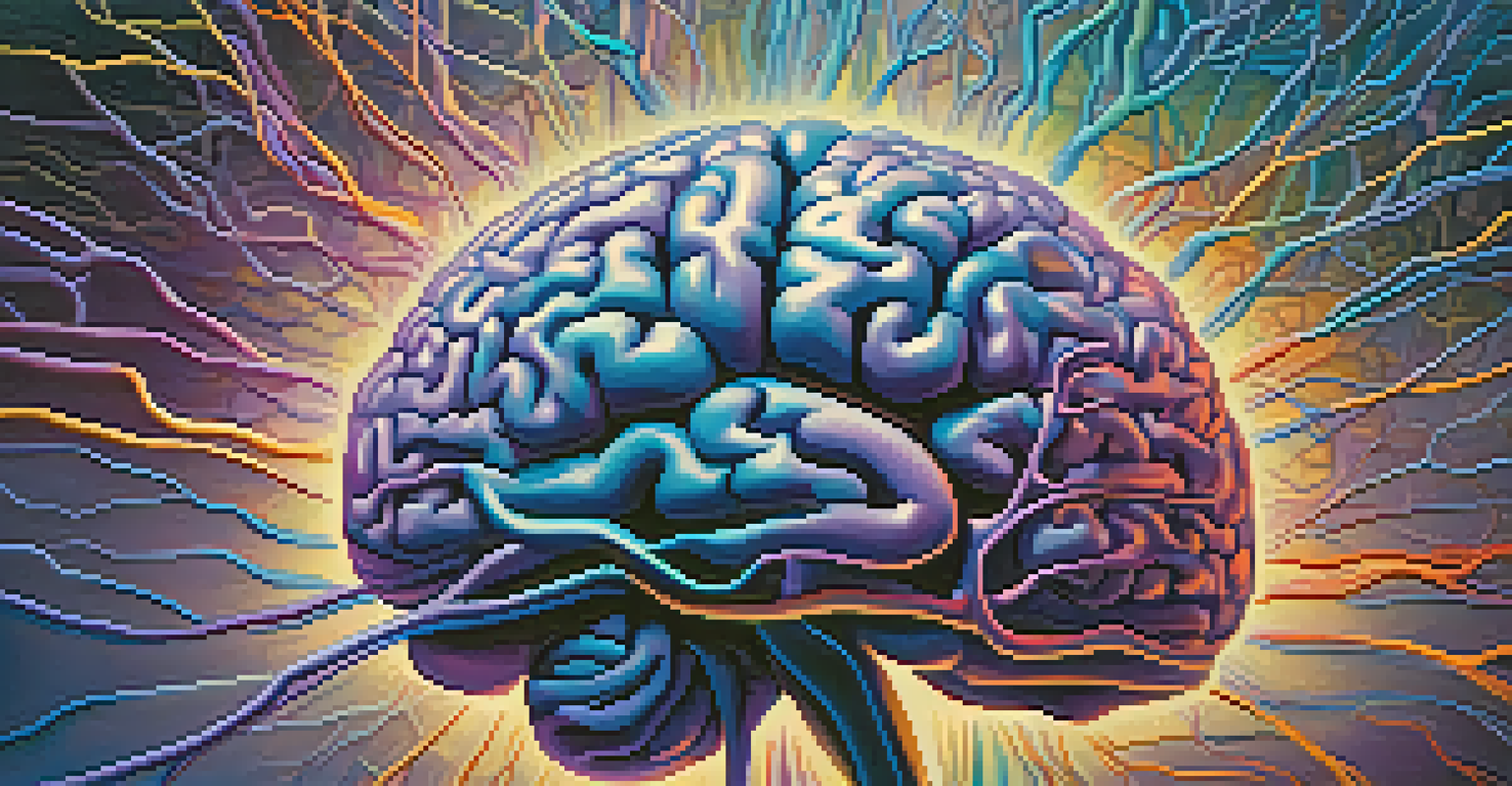The Impact of LSD on Memory: A Comprehensive Overview

Understanding LSD: A Brief Introduction
LSD, or lysergic acid diethylamide, is a powerful hallucinogenic drug that alters perception, mood, and cognitive processes. Developed in the 1930s, it gained popularity in the 1960s as part of the counterculture movement. Today, LSD is often discussed in the context of both recreational use and potential therapeutic benefits.
The mind is everything. What you think you become.
The drug interacts with serotonin receptors in the brain, leading to changes in sensory perception and thought patterns. This alteration can significantly impact how memories are formed, recalled, and processed. Understanding these mechanisms is crucial for exploring LSD's effects on memory.
While many view LSD as purely a recreational substance, emerging research suggests it may have therapeutic applications, particularly in mental health disorders. By examining its influence on memory, we can gain insights into both its risks and potential benefits.
The Science Behind Memory Formation
Memory formation is a complex process involving various brain regions, primarily the hippocampus and the prefrontal cortex. These areas work together to encode, store, and retrieve memories. Understanding this process helps us appreciate how substances like LSD can affect cognitive functions.

When we experience an event, our brain encodes it through neural connections. These connections strengthen over time, which is how we form lasting memories. However, LSD alters these neural pathways, often leading to vivid, unusual, or fragmented recollections.
LSD Alters Perception and Memory
LSD significantly affects perception and cognitive processes, which can lead to both enhanced creativity and memory distortion.
Research indicates that LSD may enhance certain types of memory, such as associative memory, which is the ability to link concepts together. This could explain why some users report heightened creativity and novel insights during and after their experiences.
Effects of LSD on Short-Term Memory
Short-term memory is crucial for daily tasks, allowing us to retain and manipulate information temporarily. LSD can significantly impact this function, often leading to difficulties in concentrating and recalling information. Users may find it challenging to keep track of conversations or tasks while under the drug's influence.
Memory is the treasure house of the mind wherein the monuments thereof are kept and preserved.
For instance, someone might start to tell a story but lose their train of thought mid-sentence, leading to confusion or frustration. This disruption can affect social interactions and decision-making during the experience, demonstrating how LSD can muddle our cognitive processes.
Interestingly, some anecdotal reports suggest that while short-term memory may falter during the trip, users often experience a sense of clarity or insight afterward. This paradox highlights the complex relationship between LSD and memory.
Long-Term Memory: LSD's Lasting Impact
Long-term memory involves the storage of information over extended periods, allowing us to recall past experiences and knowledge. While the immediate effects of LSD on short-term memory are more apparent, its influence on long-term memory is a topic of ongoing research.
Some studies suggest that LSD may enhance the recall of specific memories, particularly those associated with strong emotions. This could be due to the drug's ability to create profound emotional experiences that make memories more vivid and easier to retrieve later.
Therapeutic Uses for Memory Issues
Emerging research suggests that LSD may have therapeutic potential in treating conditions like PTSD by facilitating emotional breakthroughs.
However, the potential for distortion exists. Users may remember events differently than they occurred or blend memories from different experiences. This highlights the importance of context and emotional resonance in shaping our long-term memories.
Therapeutic Potential of LSD in Memory Treatment
Recent studies have begun to explore the therapeutic potential of LSD, particularly in treating conditions like PTSD and anxiety. The drug's ability to alter perception and promote emotional breakthroughs may lead to more effective memory processing for individuals with trauma.
In therapeutic settings, controlled doses of LSD can facilitate deeper emotional exploration, allowing patients to confront painful memories in a safe environment. This can be a pivotal step in healing, as it encourages the reprocessing of traumatic experiences.
However, while the preliminary results are promising, more rigorous studies are needed to fully understand LSD's role in memory treatment. Ethical considerations and potential risks must be weighed carefully in this evolving field.
The Risks: Memory Distortion and Misremembering
While exploring the benefits of LSD on memory, it's essential to acknowledge the risks involved. The drug can lead to memory distortion, where users may misremember details or create false memories altogether. This phenomenon can complicate personal narratives and lead to confusion.
For example, a user might vividly recall an event but with significant alterations to the actual happenings. This can affect relationships and self-perception, underscoring the importance of clarity in recalling experiences under the influence of LSD.
Risks of Memory Distortion Exist
While LSD may enhance certain memory types, it also poses risks of misremembering and creating false memories, affecting personal narratives.
Additionally, long-term use can exacerbate these issues, leading to persistent memory problems. Therefore, understanding the balance between potential benefits and risks is crucial for anyone considering LSD in any context.
Conclusion: Balancing Insights and Caution
The impact of LSD on memory is a multifaceted topic that invites both curiosity and caution. While the drug offers unique insights into memory processes and potential therapeutic applications, it also presents risks of distortion and confusion.
As research continues to unfold, it’s vital to approach the subject with an informed perspective, recognizing both the historical context of LSD and the emerging findings. This balanced understanding can help individuals make educated choices about their experiences.

Ultimately, the journey of exploring LSD's effects on memory lies at the intersection of science and subjective experience, encouraging a deeper conversation about the nature of consciousness and memory itself.